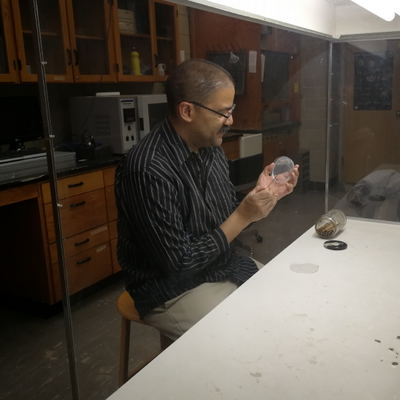In conversation with Trevor Charles: a representation of Black excellence in science
By: Krista Henry (she/her)
Celebrating Black History Month
Professor Trevor Charles (he/him) is a microbiologist and biology professor at the University of Waterloo with a keen interest in sustainability. Charles has years of experience in bacterial genetics and is the director of the Waterloo Centre for Microbial Research.
Charles first became interested in microbiomes through his love of plants. Microbiome is the analysis of genetic material recovered directly from environmental samples.
Today, he is an award-winning researcher whose research emphasis is on functional metagenomics, bioplastics and bacterial genome engineering.
He is also the co-founder of Metagenom Bio Life Science and LiftOff by CCAWR, a Black-led business accelerator for Black entrepreneurs in Waterloo Region and Wellington County. He employs and mentors emerging talent like co-op students throughout his many endeavours.
Charles is a panelist on Co-operative and Experiential Education’s (CEE) upcoming ‘Elevating Black excellence in the workplace’ panel discussion.

Trevor Charles
Microbiologist and biology professor at the University of Waterloo
Tell us a bit about your career history and current role.
My entire career has been oriented towards scientific research. I was born near Vancouver, and I did my undergraduate in Microbiology at the University of British Columbia (UBC). Although I initially had my sight set on medical school, I became captivated by the idea of microbes that are associated with plants. By some stroke of luck, I was accepted into the graduate program at McMaster University, to work in the lab of Turlough Finan, a new professor setting up a lab to study symbiotic nitrogen fixation. In Turlough’s lab I was trained as a bacterial geneticist and grew to appreciate the elegance and creativity of this field.
I then moved to Gene Nester’s lab at the University of Washington in Seattle, where I spent a couple of years as a postdoc studying Agrobacterium, bacteria that transfer DNA from their genome into the plant genome. Following this, I took my first faculty position at McGill University before moving to the University of Waterloo.
My research program moved from being purely fundamental to more applied, addressing societal challenges within a circular bioeconomy framework. More recently, I’ve become an entrepreneur and founder of a series of companies in the agricultural, environmental, biological and clean technology spaces. These companies are still small, but they are gaining traction. I am learning a lot about building and running a business along the way.
I am also founder and executive director of the LiftOff Black Entrepreneurship Program that supports aspiring Black entrepreneurs in Waterloo Region and Wellington County. It has been running for just over a year and has enjoyed great success.
What’s the best advice you ever received, career wise or other?
I was fortunate to work with Harry Jerome, the great Canadian sprinter, one summer during my youth. He taught me the importance of being self-sufficient, independent and not relying on others.
Why is it important to celebrate Black History Month?
Black History Month is an opportunity to really celebrate Black excellence and look ahead to success in the future. This is a time to reflect on the excellence of Black talent in the Science, Technology, Engineering and Mathematics (STEM) field and the need for further representation.
What figure in Black history do you look up to most and why?
John Coltrane and Oscar Peterson for their genius. John Coltrane is a Black American jazz saxophonist, bandleader and composer. He is among the most influential and acclaimed figures in the history of jazz and 20th century music. Oscar Peterson was a Black Canadian jazz pianist and composer. Peterson is considered to be one of the greatest jazz pianists of all time, releasing more than 200 recordings, and winning seven Grammy awards as well as a lifetime achievement award from the recording academy.
What is your understanding today of the experience(s) Black employees have at work? Based on what you know, what is and is not working?
I think it all comes down to a lack of representation.
People need to see themselves reflected at work
and in leadership positions.
Overall, this is a difficult question to address and something I hope can be explored more at the panel discussion.
Want to hear more from Professor Charles?
Register today for our FREE virtual panel discussion titled ‘Elevating Black excellence in the workplace.’



